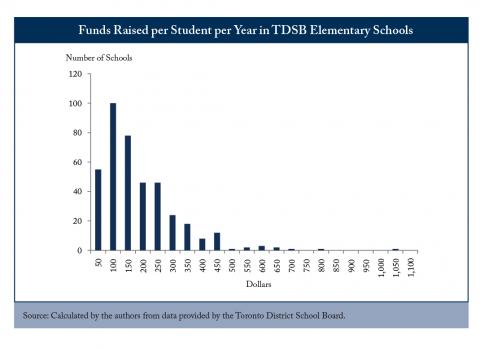From: David Johnson
To: Parents across Ontario
Date: June 23, 2017
Re: On School Fundraising and Outcomes, Focus on What Really Matters
Congratulations, parents. You and your kids almost made it through another school year. At this point you may be wondering whether any external funds raised by your school should be either equalized or be subject to further limitations; and if this occurred, would student outcomes in Ontario elementary schools be more equal? Based on results from a paper published earlier this year, we find that you can put your mind at rest on this issue. The contribution of fundraising to both the increase in inequality and to variation in Education Quality and Accountability Office (EQAO) outcomes is small.
Our findings show that variation on funds raised per student across Toronto District School Board (TDSB) elementary schools is quite strongly associated with the background of the students attending the school. School structure with older students, that is higher grades, raise a lot more funds than other elementary schools. Older students do more expensive activities. Hence, inequality in funds raised across schools is the result of school inequality and school structure, instead of a cause of school inequality.
The amount of funds raised per student is very small at elementary schools in Toronto, an annual average of only $161 per student. Annual board spending is about $11,000 per student. Only 10 elementary schools in the TDSB raised more than $500 per student per year (see figure below). It is not very clear how such a small amount of funds could have any impact on school outcomes.
Do schools with extra funds have better EQAO results? Here we drew comparison across schools where students come from similar social and economic backgrounds. What we saw was a very weak association of extra funds raised and better EQAO results. We believe even the small association between funds raised and academic results is difficult to interpret as resulting from such a small amount of extra resources. We think it is much more likely that an extra $100 per student raised (a large amount compared to the average) is a proxy for parental or teacher engagement at a school rather than any direct effect of extra resources. The government should not worry much, if at all, about fundraising differences across schools. Instead, the focus of government and school councils should be on improving teaching and engaging parents.
Educational policy and parental attention should focus on what really matters. Teacher quality and support from parents are much more important determinants of school outcomes than resources or activities provided with external funds.
David R. Johnson is a Research Fellow at the C.D. Howe Institute, Professor of Economics at Wilfred Laurier University, and is co-author of the Institute study, Unfair Advantage? School Fundraising Capabilities and Student Results.
To send a comment or leave feedback, email us at blog@cdhowe.org.






